 |
|
 |
2021
July
29
|
The Crescent Nebula (NGC 6888)
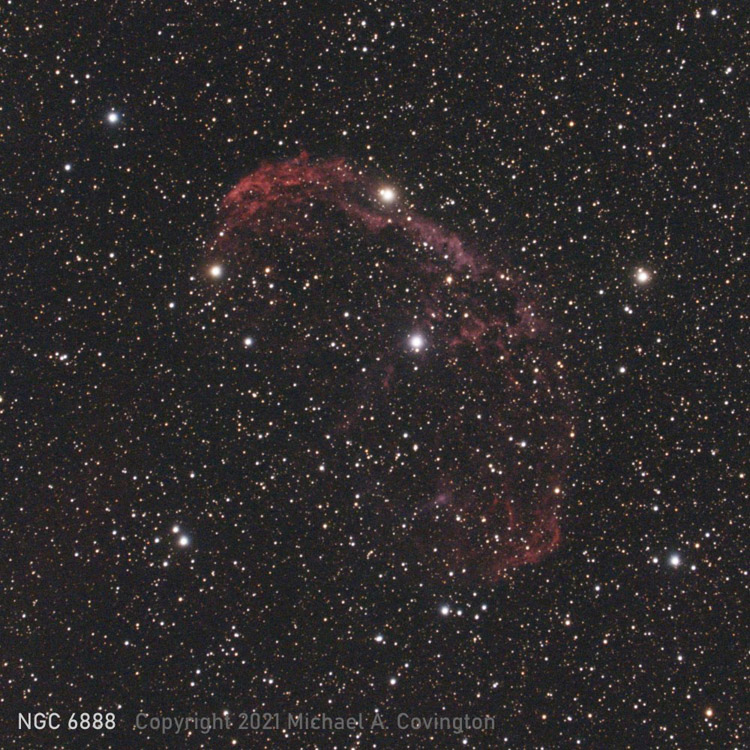
For the first time in weeks, it was clear last night, and I was able to do a short
astrophotography session. I took 18 two-minute exposures of this nebula and used 16 of
them. (Two had very slight tracking problems, possibly caused by my stepping near the
telescope.) The instrumentation consisted of my Celestron 8 EdgeHD, f/7 reducer,
and Nikon D5500(a) (at ISO 200)
on my iOptron GEM45 mount, which is working very well since it came back from repair.
I was in town, under a rather hazy sky. But it was better than no astrophotography
at all, and it certainly confirmed that the equipment was working.
The nebula consists of two shells of gas thrown out by a star.
Permanent link to this entry
A British mystery
COVID is back... Georgia and the whole United States are having an explosive upsurge in
the number of new cases... except that they are almost all among unvaccinated people.
Even so, mask precautions are being resumed in many places.
The same thing happened in England not long ago, but now their case rate is plummeting
as sharply as it rose.
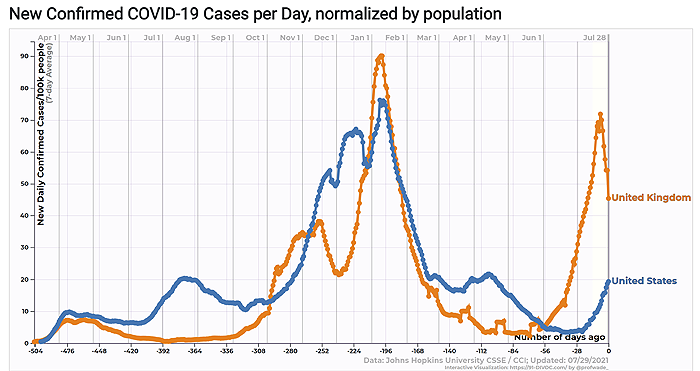
Nobody quite knows what happened, but we can hope that something similar might happen
here, at least if it's genuinely good news and not just a fall-off in testing.
Permanent link to this entry
A COVID math trick
This is a made-up example (to keep the numbers simpler) but resembles what is presently
reported for Los Angeles.
Imagine a place with a population of 10,000,000, of whom 80% are vaccinated.
That makes 8,000,000 vaccinated and 2,000,000 unvaccinated.
Suppose there were 20,000 new cases of COVID this week, and 25% of those (that is, 5,000)
were in vaccinated people.
Does this mean the vaccine isn't very effective? That 25% of vaccinated people still get COVID?
No, not at all. Remember, the vaccinated people outnumber the unvaccinated, 4 to 1.
You have 15,000 new cases out of 2,000,000 unvaccinated people. That's 1 out of 133.
And you have 5,000 new cases out of 8,000,000 vaccinated people. That's 1 out of 1600.
The vaccinated people are 12 times safer! That is, the vaccine is about 92.5% effective.
That seems a little low, but apparently they're counting people who have had one dose,
not necessarily two.
You have to multiply the case ratio (75% unvaccinated / 25% vaccinated) times the
population ratio (80% vaccinated / 20% unvaccinated) to get the ratio you're looking for.
Permanent link to this entry
What if a sitting president commits a crime?
Never mind what you think Trump did or did not do. The issues that arose on January 6
made it clear that we have a gap in our legal system.
We have no way short of impeachment to punish a sitting president for committing any crime,
not even if it were an obvious and heinous one.
The reason is that the Department of Justice has a "policy" that we can't indict a sitting
president. That policy is not in the Constitution, nor the statutes, nor even case law.
It's just a Department of Justice memo, and in my opinion it needs to be overturned.
I think impeachment was intended for misuse of office that might not fit the existing
criminal laws. After all, presidents can do things that nobody else can do, and might even
be able to craft legal loopholes for themselves — so we need (and have) an impeachment
process that is not tied to statutory laws and is carried out by a legislative body (Congress).
YouTube commentator Glenn Kirschner points out one
more thing. If the presidency makes someone unindictable, then a person who steals the
presidency (by bribery, etc.) cannot be punished for it! Since Trump's strongest supporters
definitely believe an election can be stolen, this should give them pause.
Permanent link to this entry


|
2021
July
26
|
The amateur doctors are still out there...
A friend of mine stirred up a nest of antivaxers on Facebook today, and I participated
in the conversation with the intent of educating the audience, not winning a battle of wits
with unarmed opponents. Here's what I posted as a summation:
I have just two more things to say to those who still advise people not to be vaccinated.
(1) When you tell me not to trust my doctor, you are taking on a heavy burden of proof.
I actually have two doctors, as well as knowing several professional medical researchers,
and they all advise me to be vaccinated (which I am).
It's possible they're all wrong, but proving it is a tall order.
You would need to make a very convincing case, and the real question is whether
it would convince my doctor, not whether it would convince me (a person untrained in medicine).
Buttonholing me and demanding that I read one article or watch one video won't do it.
Which leads to the second point...
(2) If there were a good case against vaccination (even if only a minority of experts agreed with it),
then it would be emerging as a coherent body of knowledge, with systematic understanding, and,
most importantly, well-thought-out responses to the huge body of research that is cited on the other side.
But that is not what I am seeing. I get occasional citations of single articles
(not scientific discussions), many of them not in refereed journals, as if all the other research
should just vanish. And I see a lot of people asserting things while giving no reason at all to
believe them, as if saying it made it true.
What's worse, I get a lot of anger.
People with no medical qualifications rant at me and call me arrogant for not obeying their
commands to swallow their assertions. And they pop up with "facts" that seem to be made up on the spot
and are easily shown to be false.
If a layperson wants to pass along the medical advice that the medical community is giving, that's one thing.
Many laypeople do this all the time. But if people without medical qualifications start pushing
different medical advice than the professionals give, that's something entirely different,
and I see no reason to pay them any attention.
Permanent link to this entry


|
2021
July
25
|
Happy anniversary to us!
Today Melody and I have been married for 39 years.
I think that means we have lasted 3,544 times as long as Romeo and Juliet!
Permanent link to this entry


|
2021
July
21
|
Inching toward normalcy, or not
Let the record show that today was my first afternoon in the Science Library that
felt "normal," at least within the range of what it was like in pre-pandemic times.
(My last "normal" afternoon there was, if memory serves me right, March 5, 2020.)
It was still abnormally depopulated, but there were enough people there that I could
see a few students in each direction and hear "the hum of the hive," the soft voices
of students studying together — which I'd much rather hear than silence punctuated
by occasional mechanical noises.
"The hum of the hive" is C. S. Lewis's term for the "faint murmur ... of semi-whispered
conversations" that he heard in the Bodleian Library.
Letters of C. S. Lewis, at 31 March 1928.
I spent an hour and a half there, reading books, after work at FormFree, just for
old times' sake.
But COVID is spreading like wildfire again — almost exclusively among unvaccinated
people — and we may be having a shift in public opinion.
The brave vaccine opponents don't look so heroic now that people are seeing unvaccinated
people dying. The rugged individualists who are too selfish to protect their neighbors
are no longer quite as much admired.
But as people turn away from foolishness, the fools become all the more
flamboyant. Today's disgusting sight was Rep. Marjorie Taylor Greene (R., Ga.),
in a press conference that she called,
cackling with laughter — cackling like a bad portrayal of a maniac in
a movie — when someone contradicted her assertion that only fat people and old
people die of COVID.
If not cackling, then at least grinning comically and laughing derisively.
I have not been able to find a shareable link to the original C-SPAN video (yet).
Click here to see it quoted in a video
by a commentator (and this is not an endorsement of him).
Laughing at people's suffering and death. The video clip needs to haunt her forever.
Permanent link to this entry


|
2021
July
17
|
A bridge of a different color
(and how I got back into amateur astronomy)
Sometimes, color film is defective, and that fact gave Melody some very unusual pictures in
November of 1979. They are on Sears brand film (that is, off-brand film), and when they came back from processing,
they had
no cyan dye and little yellow dye — basically, they were monochrome pictures in magenta and white.
Here are the two best from that batch, postprocessed (in different ways) with Photoshop just
today.


What you're looking at is Watson Mill Bridge, east of Athens, Georgia.
Melody and I went there while I was home from Yale for Thanksgiving of 1979.
And on the way back, driving west, we saw Venus in the sky, and I told her about the amateur
astronomy I had done in the early 1970s, and she was intrigued and encouraged me to get back into it.
I first became seriously interested in astronomy in 1968, but after moving to Athens and starting at
UGA in 1973, I was too busy with other things, and lived in a house where it wasn't practical
to observe from the yard. I sold my Tasco refractor in late 1973 and my
bulky, non-portable RV-6 Dynascope in 1975 or early 1976. I did do a bit of fixed-tripod
astrophotography in 1975 and 1976, but I considered it photographic experimentation rather
than astronomy.
But after that trip to Watson Mill, I moved fairly fast. I had the know-how but lacked the equipment.
At my request, for Christmas 1979 my mother gave me a Coulter CT-100, a super-compact Newtonian that
was designed for travel but was optically disappointing. Nonetheless, my expectations of it were realistic,
and I bought a copy of Mallas and Kreimer's Messier Album at the Yale Co-Op in December and made
plans to view all the Messier objects, starting in Christmas vacation.
Exploring astronomy books in the Yale libraries, I felt like I had acquired super powers, because now
I could do much more mathematics, use computers, read foreign languages,
and (as Knuth put it) play a great library like a fine musical instrument,
using all its resources to pursue my interests.
Unfortunately, the telescope was
back-ordered until March, so my re-entry into astronomy was done with nothing more than a 7×50
monocular, plus some fixed-tripod astrophotography, which fascinated me.
I started logging Messier objects visually with the Coulter during spring break.
And although the Coulter served its purpose, I outgrew it so quickly that by summer 1980 I had ordered a Celestron 5.
The rest is history; the Celestron was ready for astrophotography, I did a lot of experiments, and in
late 1981 was already planning and drafting the first edition of Astrophotography for the Amateur.
All of this was triggered by a twilight view of Venus and an encouraging girlfriend, who has continued to
encourage me all these years!
Permanent link to this entry


|
2021
July
15
|
Short notes
"Bearing the Flame," by C. A. Barrett: Let me highly recommend — very
highly recommend — a piece of Christian fantasy fiction in a Byzantine setting.
Click
here to read it in the online magazine Mysterion.
If you like C. S. Lewis and Charles Williams, you'll like this.
The author happens to be my daughter. I am glad to be ancestor of such a good writer!
Wake-up music:
Let the record show that for at least two decades, maybe three, Melody's usual
wake-up music (in her CD-playing alarm clock) has been
Schönherz & Scott's Wishing Well,
the first track of a CD called Windham Hill Sampler 1988.
It's good music to wake up to; it starts softly and grows in a measured way.
Click on the link to hear it.
Some YouTube suggestions:
Speaking of music, let me recommend a video:
Rick Wakeman talking about Vivaldi as a rock star
and Vivaldi's "Four Seasons" as an innovative piece of music.
(Don't worry, it's all about Vivaldi, not about rock.)
Vivaldi is such a shadowy character (as regards biographical information)
that most of us, even if we really like his music,
don't know as much about him as we ought to. Have a listen!
Two science video series that I recommend include
Becky Smethurst on astrophysics
and
Sabine Hossenfelder on quantum physics
(her version of it is a tad closer to classical physics
than some people's).
Both of these are eminently qualified scientists.
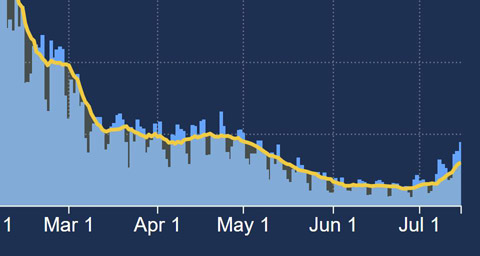
Georgia is definitely having a fourth wave of COVID. I hope it is shallow and short.
Because of vaccination, I am not in much danger, but I am slightly cutting back some of
my activities.
Permanent link to this entry


|
2021
July
11
|
Tchaikovsky, Tschaikowsky, or who?
How did the name of the best-known Russian composer get to be spelled
Tchaikovsky by some people, Tschaikowsky by others, and
(rarely) even Chaikovsky?
It has to do with conversion from the Russian alphabet and getting tangled up
in other languages along the way.
In Russian, his name is Чайко́вский.
And right away, thankfully, we sidestep a controversy.
Everybody has agreed that the ending, -ский,
should come in as -sky.
It could easily have been -ski, -skii, -skij, or -skiy.
(Or more possibilities if you allow diacritical marks.)
But since nobody opened this can of worms, we'll leave it closed.
The whole name should have come into English as Chaikovsky.
If other languages hadn't interfered, that's how we would spell it.
But French and German don't have the ch sound that is so common
in Russian and English. In French, the letters ch have the sound of English sh
(consider chamois, champagne, etc.). The only way to get the
sound of English or Russian ch is to put a t in front of it.
So Tchaikovsky is Чайко́вский rendered into French, and many
(perhaps most) English-speaking music enthusiasts picked it up.
Tschaikowsky is what happens when the name is rendered into German.
Like French, German has to take the sound of English sh and put a t
in front of it. But in German, the sound itself is spelled sch.
That's how you get Tsch....
And in German, the sound of English and French v is spelled w.
That's how you get the w in the middle.
Now you know!
Permanent link to this entry


|
2021
July
10
|
Exposure compensation to the rescue

When taking nature photographs like this, Melody and I are often up against a problem
with digital cameras. If the picture consists largely of dark background (like this one),
the background will be too light, and the bright object of interest will be overexposed
and blown out.
The cure — demonstrated here — is to use exposure compensation.
The camera has a +/- button that allows you to make the picture darker or
lighter than the exposure meter would initially prefer.
On the Nikon D5300, which is typical, pressing +/- enables you to make
adjustments with the thumbwheel. The adjustment is displayed in the viewfinder as a scale
that looks rather like this:
- . . 0 . . +
|||
In this example, the negative part is filled in from 0 to the first mark, showing that you're asking for 1 stop
less than the normal exposure. As you can see, it worked.
On the D5300, this is a "sticky" setting — it persists even after the camera is turned off
and on again — so be alert for the scale in the viewfinder.
Canon DSLRs have a menu setting called "Highlight Tone Priority" and guess what it does?
Exactly this — one stop of underexposure. Many of us may want to take almost all our
pictures this way.
Permanent link to this entry


|
2021
July
8
|
The word bulletin has become rare in my lifetime
The other day I was thinking about how I never hear the word bulletin any more.
In the 1960s, it was common, and meant not only an urgent notice, but also any kind of
newsletter or even, sometimes, technical data sheet or what we would now call a white paper.
Google Books Ngram Viewer
confirmed my suspicions. Look how the word has fallen out of usage!
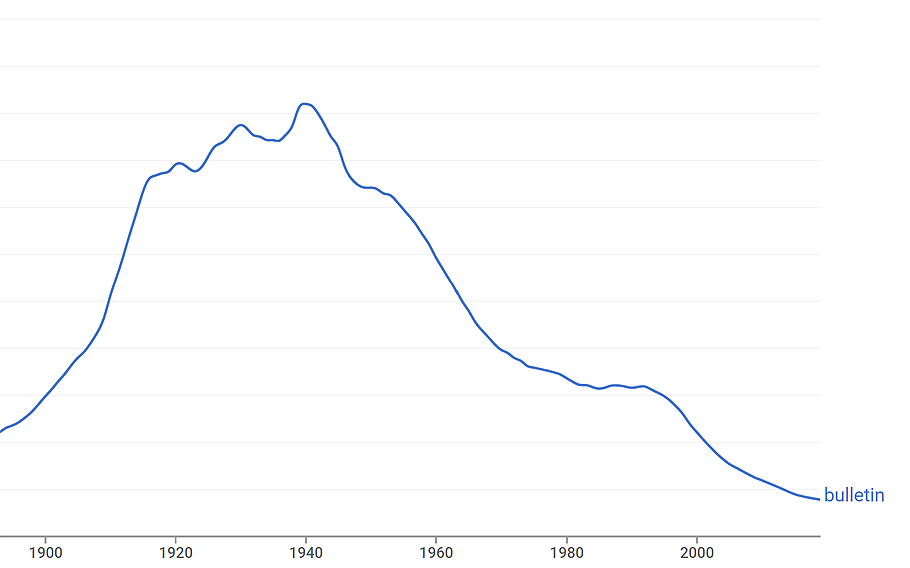
The bottom line of this graph is indeed zero, so the graph really says what it appears to.
Bulletin was 12 times as common in 1940 as it is now.
This is strange because the thing hasn't become any less common.
The things we used to call bulletins are still around, as common as ever.
I don't really know the cause of this. I thought maybe bulletin was World War II jargon,
but actually, its heyday was about 1920 to 1940, perhaps connected with the rise of newspapers
and broadcasting. The word itself goes back before 1800, came to us from Italian through French,
and is the same word as "papal bull" (document signed with a bulla seal) plus not one but
two diminutive suffixes.
Permanent link to this entry
Is Friday the 13th really more common...?
I've read several times that the 13th of the month more often
falls on Friday than on any other weekday,
and for a while, I flatly didn't believe it.
The length of a year is not divisible by 7, so the seven days of the week should cycle constantly
through all positions relative to the days of the year. Right?
See this article for more about that.
But my Cambridge college-mate
Mike Knee set me straight.
The short answer is that something is divisible by 7.
Not the length of the year or even the century, but something else.
Thanks to the Gregorian Calendar, century years (1900, 2000, etc.) aren't leap years
unless they are divisible by 400.
That means a period of 400 years has not 100 leap years, but only 97 of them.
And that, in turn, means that 400 years, on our calendar, comprise
(400 × 365) + 97 = 146,097 days
and 146,097 is divisible by 7.
What this means is that every 400 years, the progression of the days of the week through
the calendar gets reset. As a result, the distribution of Fridays across days of the month
is not quite even, although it's very close.
Note that this is a pure coincidence. The number 146,097 has nothing to do with weeks.
The Gregorian reform (which makes 400 years be 146,097 days rather than 146,100) was carried out to make
the average length of the calendar year 365.2425 rather than 365.25 days.
The truly correct length, based on the earth's orbit, would be about 365.2422, so in a couple of thousand years
we are going to have to make another adjustment.
Permanent link to this entry


|
2021
July
5
(Extra)
|
Partial end of a pandemic routine
For the first time in 15 months or so, the Georgia Department of Public Health
is no longer releasing COVID case numbers on weekends or holidays.
Accordingly, my daily 3 p.m. routine no longer includes checking the COVID numbers
unless it's a weekday.
This is not as big a loss as it sounds like, because weekend reporting has been
incomplete all along. I presume that tomorrow, they will release numbers for
July 3, 4, and 5, and I wonder what they'll look like. The numbers for Friday,
July 2, were peculiar, with a seeming large spike in percentage of tests positive.
Permanent link to this entry
The case of the fake FTDI FT232
An FTDI FT232
is a USB serial port designed to be built into other equipment,
i.e., connected to a microcontroller rather than an actual RS-232 port.
Many of my fellow amateur astronomers have encountered these in telescope
controllers. They have many other uses. They are a quick way to add USB
to a piece of equipment without having to create a USB driver for it
(and then maintain it in all future operating systems). Instead, you use
the driver supplied by FTDI.
A while back I bought some Chinese-made FTDI interface boards from Amazon
in which
the FTDI chips turned out to be fake.
The symptom was that they all had the same serial number; real FTDIs have unique serial numbers so that many of them
can be connected to the same PC at the same time.
Also, mine were apparently not fully functional, though I did not test
them very thoroughly once I identified the
serial-number problem.
The device driver used by the PC is supplied by FTDI
and, of course, has the perfect right to detect fake chips and refuse to work with them.
The rumor mill says that at one time the genuine FTDI driver would reprogram the fake chips
not to work, and in response, the fakers disabled the reprogramming. In any case, there is no
reason to expect a fake chip to work reliably.
I contacted Amazon and got a refund. If they don't want the boards back, I may get some real FTDI chips
and replace them, to build my microsoldering skill.
Permanent link to this entry


|
2021
July
5
|
Through an art student's eyes:
Melody's early photography
We recently digitized a box of about 300 color slides that Melody took during her first three
years of owning a good camera (the Minolta SRT-101 that was her high school graduation present
from her parents). Here are a few of the best — with the proviso that her very best
early photographs are in a separate portfolio, and we'll get to them later. Just like me, she
specializes in dramatic patterns and shapes.
These are mostly on Kodachrome 64. In some of them, the edge of the slide mount has been
left in the picture, forming a black border.
Looking east from the second floor of the UGA Main Library:
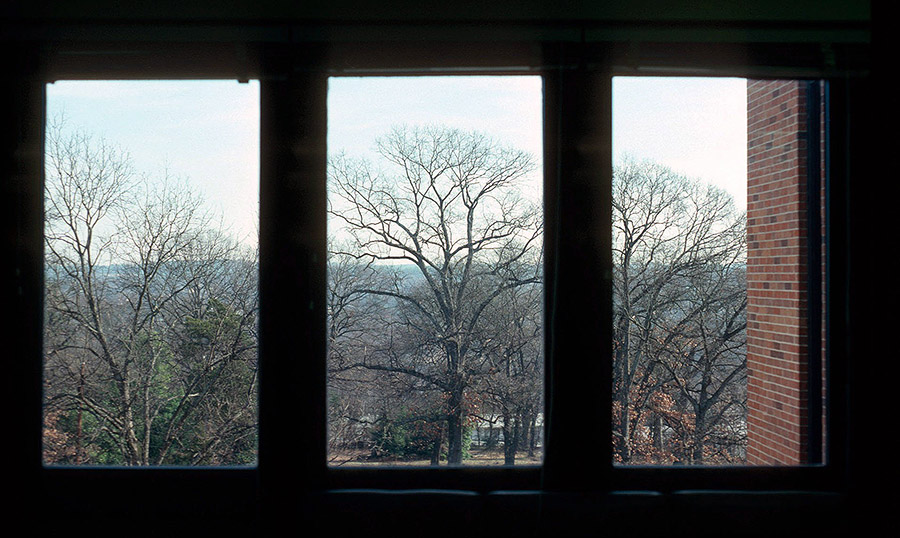
A Georgia mountain stream, believed to be near Anna Ruby Falls:

A rock quarry near Elberton, Georgia, visited on a geology-class field trip:

One of many dramatic shapes in the quarry:
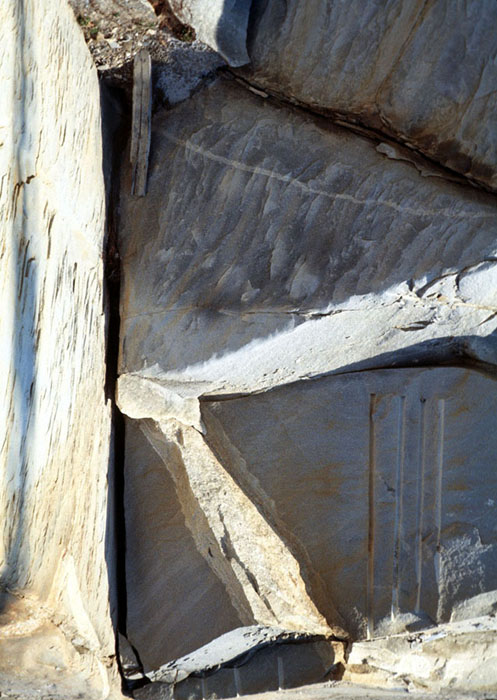
Linville Caverns, North Carolina, 1977:

Myrtle Beach, South Carolina, 1977, on the same vacation trip:

A fan in a painting studio:
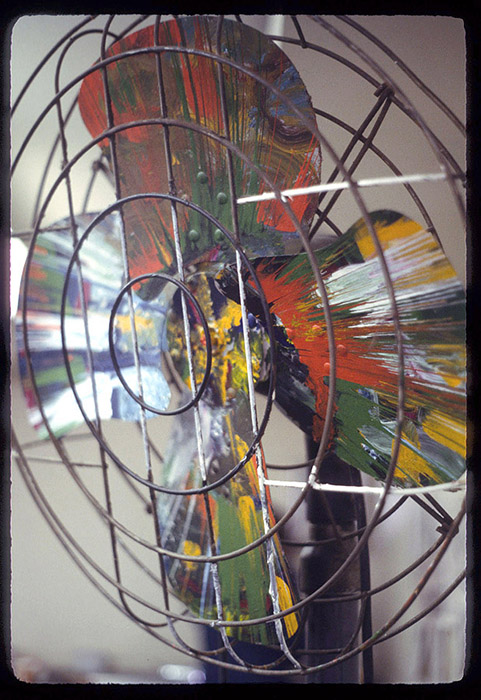
A very red flower:

Stay tuned for more!
Permanent link to this entry


|
2021
July
2
|
Inoperative Nikon ML-L3 remote control?
Try a thicker battery
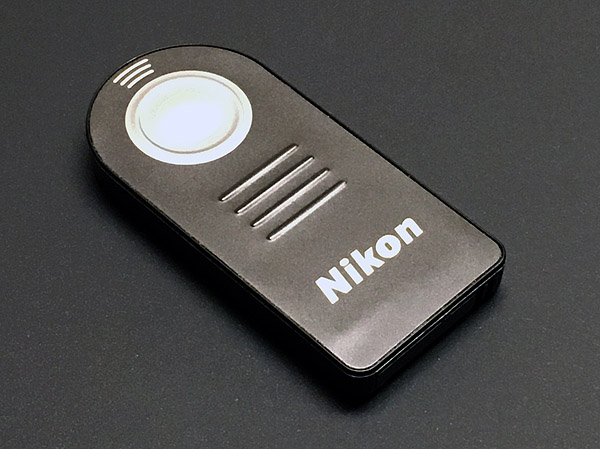
This probably also applies to other small remote controls of similar construction...
The Nikon ML-L3 remote control that we occasionally use with our DSLRs was inoperative
despite having a good CR2025 battery. Examination showed that it was not emitting an
infrared signal.
The battery holder in the ML-L3 makes contact with the negative side face-on
and with the positive side at the edge.
Several online discussions point out that the negative side often fails to make contact
because there is no pressure on the opposite (positive) face.
The cure? Put in a CR2032 battery, which is the same voltage but is 3.2 mm thick
instead of 2.5 mm thick. It's a tight fit, which is what you want.
I did it, and it worked.
Permanent link to this entry


|
2021
July
1
|
Advice for computer science majors
As we start thinking about college classes this fall, here are some thoughts, distilled from
a conversation with a student this afternoon. Recall that I taught at the University of Georgia
for almost 30 years, and most of the courses were offered through the Department of Computer
Science although that is not where I was headquartered.
(1) Learn about the computer systems people are actually using, especially Microsoft Windows.
You didn't go to college mainly to learn BSD UNIX (1977-1995), except as a stepping stone
toward newer things.
Learn about the Mac and Linux too, but don't shun Windows. It's the operating system most
people use. It's also where most of the innovation has taken place in the past twenty years.
Some people still seem to think Windows is a GUI clumsily built upon DOS — which it
was in the 1980s — and don't realize it was completely re-architected in the late 1990s,
with a design based on VAX/VMS,
and is the only major operating system not derived from UNIX. Ignorance of it will cost you
employability.
(I do not claim that Windows is superior in all respects. Linux is smaller and faster, and my
understanding is that macOS is, too, and both of these give better performance on less powerful
computers. They also have the ability to run UNIX programs written many years ago, which can be important for decades-long academic research projects. I often use Linux for all of these reasons.
But Windows is something you can't ignore.)
(2) Don't be misled by 1980s nostalgia, either your own or your professors'.
The 1980s were a great time to be a computer scientist. People who had been laboratory geeks
in 1975 were suddenly hot property, extremely employable, as computers suddenly became
affordable. And exciting things were happening in academia — research labs could afford
much more computer power than even a short time before, and discoveries were proliferating.
But the 1980s were a long time ago. Do not try to live in them. Your career is in the future.
Some of you will live to see 2080.
(3) Recognize bad education when you see it. Unfortunately, computer science is a field
in which colleges can get away with bad teaching. Some students with good background and talent
can learn all the material from
the textbooks and their own experiments
no matter how badly the courses are taught, and the job market gives them an
incentive to do so. And if the rest of the students flunk out, some educators will say that
just proves what a rigorous program they are running.
Wrong. When students commonly fail courses, something is wrong. Either the course is badly taught,
or the students were not properly prepared, or both. I have always believed that in a properly
functioning educational institution, most of the students should do well, and failure should be rare
(and should be diagnosable when it happens — not just "this is hard material").
Every department of English or Art History knows this, because if they don't run their programs well,
their students will simply go away. Computer science and engineering, however, sometimes make bad
teaching a tradition because students have a financial incentive to tolerate it.
Permanent link to this entry
News items
Lens review: You've seen some of my astrophotos taken with the SharpStar Askar 200-mm f/4 telephoto lens
specially designed for astronomy. Now my review of that lens has been published
on Cloudy Nights. Click here to see it.
Job promotion: The occasional consulting work I was going to do after retirement has
turned into a regular job at FormFree, and as of today,
I have a new title: Director of Research. I supervise two other researchers, and the
research group is expected to grow.
Permanent link to this entry


|
|
|
This is a private web page,
not hosted or sponsored by the University of Georgia.
Copyright 2021 Michael A. Covington.
Caching by search engines is permitted.
To go to the latest entry every day, bookmark
http://www.covingtoninnovations.com/michael/blog/Default.asp
and if you get the previous month, tell your browser to refresh.
Portrait at top of page by Sharon Covington.
This web site has never collected personal information
and is not affected by GDPR.
Google Ads may use cookies to manage the rotation of ads,
but those cookies are not made available to Covington Innovations.
No personal information is collected or stored by Covington Innovations, and never has been.
This web site is based and served entirely in the United States.
In compliance with U.S. FTC guidelines,
I am glad to point out that unless explicitly
indicated, I do not receive substantial payments, free merchandise, or other remuneration
for reviewing or mentioning products on this web site.
Any remuneration valued at more than about $10 will always be mentioned here,
and in any case my writing about products and dealers is always truthful.
Reviewed
products are usually things I purchased for my own use, or occasionally items
lent to me briefly by manufacturers and described as such.
I am no longer an Amazon Associate, and links to Amazon
no longer pay me a commission for purchases,
even if they still have my code in them.
|
|



















